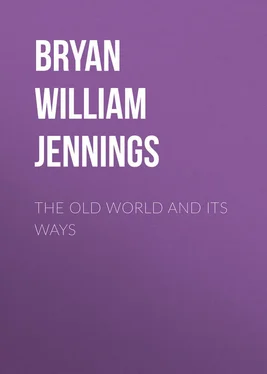William Bryan - The Old World and Its Ways
Здесь есть возможность читать онлайн «William Bryan - The Old World and Its Ways» — ознакомительный отрывок электронной книги совершенно бесплатно, а после прочтения отрывка купить полную версию. В некоторых случаях можно слушать аудио, скачать через торрент в формате fb2 и присутствует краткое содержание. Жанр: foreign_antique, foreign_prose, на английском языке. Описание произведения, (предисловие) а так же отзывы посетителей доступны на портале библиотеки ЛибКат.
- Название:The Old World and Its Ways
- Автор:
- Жанр:
- Год:неизвестен
- ISBN:нет данных
- Рейтинг книги:4 / 5. Голосов: 1
-
Избранное:Добавить в избранное
- Отзывы:
-
Ваша оценка:
- 80
- 1
- 2
- 3
- 4
- 5
The Old World and Its Ways: краткое содержание, описание и аннотация
Предлагаем к чтению аннотацию, описание, краткое содержание или предисловие (зависит от того, что написал сам автор книги «The Old World and Its Ways»). Если вы не нашли необходимую информацию о книге — напишите в комментариях, мы постараемся отыскать её.
The Old World and Its Ways — читать онлайн ознакомительный отрывок
Ниже представлен текст книги, разбитый по страницам. Система сохранения места последней прочитанной страницы, позволяет с удобством читать онлайн бесплатно книгу «The Old World and Its Ways», без необходимости каждый раз заново искать на чём Вы остановились. Поставьте закладку, и сможете в любой момент перейти на страницу, на которой закончили чтение.
Интервал:
Закладка:
The shoguns were military rulers and a number of them were men of great force and executive ability. First, the Fujiwara family controlled the country through the shogunate for nearly four hundred years; then for a century the Taira and Minamoto families alternated in the exercise of power; then came the Hojo family and others of less importance until finally the Tokugawa family became supreme in the shogunate and continued in power for something like three hundred years. The emperor lived at Nara until about 1600, when the capital was moved to Kyoto, where it remained until less than forty years ago. Tokyo, on the other hand, was the seat of the shogun power, and there is a very noticeable difference between the two cities. The shoguns fortified their castles and required the feudal lords to keep headquarters in Tokyo. One cannot go through the palace in which the emperor lived permanently without noticing how plain it is as compared with the castle (both at Kyoto) in which the shogun resided for a few days during his annual call upon the emperor. While it may seem strange that the real rulers never attempted to become emperors in name, it only shows their intelligence, for by not insisting upon the recognition of the royal family they were probably more successful in maintaining the real authority than they would have been had they questioned the divine right of the immemorial rulers.
During the early part of the last century there began to be a reaction against the shogun, and when he agreed to the treaties opening the country to foreign intercourse, his action was taken advantage of by the friends of the emperor. When the feudal lords of Choshu attacked the foreign ships at Shimonoseki Strait, the shogun was compelled to pay an indemnity of three million dollars and he attempted to chastise the Choshu leaders. His forces were defeated and he died soon afterward. The emperor seized upon this event and with the aid of the influential lords of Choshu and Satsuma abolished the shogunate in 1868. The new shogun accepted the situation without a struggle and those of his followers who attempted a resistance were soon routed.
Everything in modern Japan dates from 1868, which is called the restoration. While in the restoration the emperor was acknowledged as the sole and absolute ruler in whom all authority was vested, still it was really the beginning of constitutional government, for the emperor voluntarily promised his people a constitution, a promise which was not finally fulfilled until 1889.
The fervor of patriotism that restored to the emperor his original authority wrought wonders in Japan. The feudal lords came forward and voluntarily turned their vast estates over to the emperor and relinquished the authority which they had exercised over their tenants; then they joined with the samurai (their former retainers) in supporting the emperor in abolishing all social distinctions. From that day to this the country has grown more and more democratic, the reforms working from the upper classes down.
In 1889 the constitution promised by the emperor was promulgated. It was prepared largely by Marquis Ito who visited Germany and modeled the document after the Prussian constitution. The legislative power is vested in a diet consisting of two houses, one resembling the English house of lords, and the other resembling our house of representatives. The upper house is composed of the princes of the royal blood, marquises (these sit by virtue of their rank), counts, viscounts and barons, selected from among their respective classes, men of erudition or distinguished service appointed by the emperor, and one representative from each prefecture or state, selected by the highest taxpayers. The members of the diet, except those who sit by virtue of their rank, receive two thousand yen (one thousand dollars) per year. The members of the house of representatives are divided among the states in proportion to the number of franchise holders; last year they numbered three hundred and twenty-three and were voted for by seven hundred and fifty-seven thousand franchise holders. The franchise holders numbered less than ten per cent of the men of voting age, there being a property qualification which excludes from suffrage more than nine-tenths of the adult males.
The emperor appoints the governors of the various states, and these need not be selected from the states over which they preside. The emperor has the right to convoke and prorogue the diet and to dissolve the house of representatives; he also has the right to issue urgency ordinances when the diet is not in session, the same to be submitted for approval to the next session.
The constitution contains a bill of rights. Among other rights the Japanese subjects shall enjoy freedom of religious belief "within limits not prejudicial to peace and order and not antagonistic to their duties as subjects," and "within the limits of law" they shall enjoy "the liberty of speech, writing, publication, public meeting and association." After the Tokyo riots which followed the announcement of the treaty with Russia an urgency ordinance was issued restraining the press and certain newspapers were suspended under this ordinance, but it is probable that this urgency ordinance will be vigorously discussed at the coming session of the diet.
The emperor is assisted in the discharge of his executive duties by a prime minister and nine department ministers; besides these he has the advice of a privy council, composed of elder statesmen, of which Marquis Ito is now the president.
Each state has what corresponds to our legislature, and each city has a council; both of these bodies are elective and to the city council is entrusted the selection of the mayor.
They have a judiciary, federal and local, appointed for life, but no jury system. Among the laws is one forbidding aliens to own property, although this is avoided to some extent by long time leases. There is also a law by which a debt descends with the property to the oldest son, even though the debt may exceed the property.
Through the courtesy of Hon. N. W. McIvor, former consul general at Yokohama, now engaged in the practice of international law, I had an opportunity to meet a number of governors and congressmen and found them, as a rule, an intelligent and accomplished body of men, many of them having finished their education abroad. Their most famous minister of finance, Count Matsukata, bore some resemblance to J. Pierpont Morgan.
They have politics in Japan. The promise of a constitution seems to have been given by the emperor before there was any general agitation for it, but as about twenty-one years elapsed between the making of the promise and the realization of the hopes excited by it, there was a period of discussion. As early as 1874 several of the ministers joined in a petition asking for the promulgation of the promised constitution. Their memorial being disregarded they resigned their offices and became the founders of a democratic party. They called themselves liberals and their efforts resulted in an imperial rescript issued in 1881, fixing 1889 as the date for the beginning of constitutional government. Marquis Ito is now the leader of the liberal party, which had one hundred and thirty members in the house of representatives in 1904.
In 1882 Count Okuma organized the progressive party, which had last year a membership of ninety in the house of representatives. This is known as the party of the opposition, Marquis Ito's party being the power behind the throne. There is not as much difference between the platforms of these parties as between the platforms of the two leading parties of our country, but of the two Count Okuma's party is the more radical. The count himself is a born leader and exerts a large influence upon the politics of his country. When premier some years ago he lost a leg by the explosion of a bomb, thrown with murderous intent by a political opponent, but it did not diminish his zeal in the prosecution of reforms. The fact that there were in the last diet one hundred and thirty who styled themselves independents shows that there is a considerable body to which the opposition party can appeal when the minister makes an unpopular move.
Читать дальшеИнтервал:
Закладка:
Похожие книги на «The Old World and Its Ways»
Представляем Вашему вниманию похожие книги на «The Old World and Its Ways» списком для выбора. Мы отобрали схожую по названию и смыслу литературу в надежде предоставить читателям больше вариантов отыскать новые, интересные, ещё непрочитанные произведения.
Обсуждение, отзывы о книге «The Old World and Its Ways» и просто собственные мнения читателей. Оставьте ваши комментарии, напишите, что Вы думаете о произведении, его смысле или главных героях. Укажите что конкретно понравилось, а что нет, и почему Вы так считаете.












